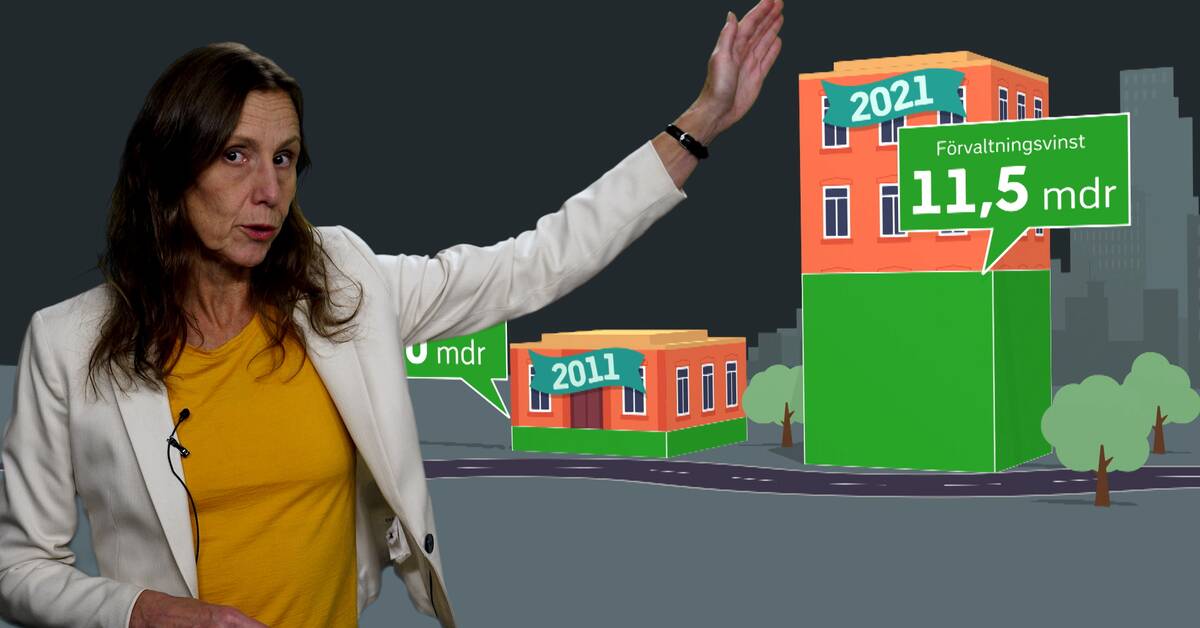While many tenants have steadily paid one or two per cent a year in rent increases over the past decade, the trend has been all the more spectacular for their hosts, thanks in large part to the central banks' zero and minus interest rates for many years.
- It has been a very good development, especially when it comes to value increases on the properties, says Patrik Hall, CEO of the housing giant Heimstaden.
But the profits on the rental income itself have also increased.
Among the country's ten largest private landlords, there are four that mainly have housing in their companies, and that report management results.
This allows you to see how much of the rental income is left when the costs for maintenance, heating, interest and other things are paid.
Strongly rising rental income
Heimstaden, Rikshem, Wallenstam and Balder have a total of almost 100,000 apartments in Sweden.
Last year, 37 percent of rental income was profit.
And between 2011 and 2021 rental income increased from four billion to 23 billion.
Much is about the companies buying and building more apartments.
One might think that the Swedish rent regulation, which keeps many rents below market level, makes residential properties hopelessly uninteresting and unprofitable.
But it has become just the opposite.
The regulation and the housing shortage in combination have become a guarantee that the rental income in existing houses can only go in one direction: up.
Akelius: Wonderful with rent regulation
Roger Akelius bought rental properties for a long time and was until last year one of Sweden's largest private landlords.
Then he sold the properties in Sweden to Heimstaden, which then became the largest in Sweden.
- For a rental property owner, rent regulation is wonderful.
You never get any vacancies, you never have to do any marketing.
And because there is rent regulation and you buy the houses used, you get them much cheaper, says Roger Akelius.
Roger Akelius also found a method to raise rents significantly, despite the rent regulation.
Every time a tenant moved out of an older apartment, it was blown out and renovated to new production standards.
Then it may be permissible to increase the rent by 40 percent or even more.
According to the tenants' association, more private landlords have followed suit.
At the same time, interest costs have fallen.
The companies included in SVT's review had an average interest rate of around 4 percent in 2011. By 2021, they had fallen to around 1.5 percent.
The offer: Ten percent rent increase
Rental income has thus risen and interest rates have fallen.
This has caused property values to skyrocket.
It has also meant that the profit margin on the tenants has increased.
Management profits have risen from one billion in 2011 to nearly nine billion in 2021.
But still, a 10 percent rent increase is now needed, say the property owners.
The tenant association does not think so.
- There are margins in the companies.
It does not, however, for single people, pensioners and students, says Erik Elmgren, head of the Tenants' Association.
For the large companies, however, it is mainly about keeping property values up - now that interest rates are rising, part of the enormous increase in value is being erased.
This makes it difficult and expensive when they have to refinance the properties in the future.
If you don't want to be forced to sell, increased rents are the only chance.

